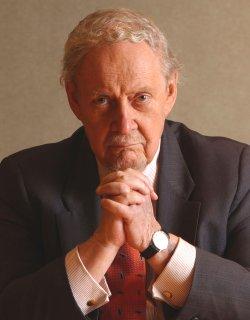Robert Bork, ’53, Jurist and Scholar: 1927-2012

Robert Bork, ’53, former judge, law professor, and Solicitor General of the United States, passed away early this morning. He was 85.
Judge Bork graduated from the College of the University of Chicago in 1948. He matriculated at the Law School in the fall of 1948, but took a leave of absence for service in the military, returning to finish his degree in 1953. He served as an editor on the Law Review and graduated Phi Beta Kappa and as a member of Order of the Coif. Bork spent time at the Law School later in his career as a visiting faculty member and as a member of the Visiting Committee.
Bork began his legal career in private practice, then became a professor at Yale Law School. His seminal scholarship on the application of economics to antitrust law was critical to both the scholarly and judicial understanding of that area. Bork served as Solicitor General of the United States from 1973 to 1977, arguing several important cases before the Supreme Court. In 1982, he was appointed by President Reagan to the United States Court of Appeals for the District of Columbia Circuit, where he served until 1988. He was a senior fellow at the American Enterprise Institute and a professor at the Ave Maria School of Law.
“Judge Bork was a great legal scholar,” said Michael H. Schill, Dean and Harry N. Wyatt Professor of Law. “His legacy to the world of law and economics and to antitrust law cannot be overstated, and we are proud that this legacy is deeply rooted in the education he got here at Chicago. On a personal note, I am proud to say that I was a student of Judge Bork’s at Yale, and remember him as an extraordinary teacher. Many of my colleagues counted him as a mentor and a friend, and he will be deeply missed by all of us.”
In June 2012, the University of Chicago honored Judge Bork with a Professional Achievement Award. Judge Frank Easterbrook of the United States Court of Appeals for the Seventh Circuit, who is both a Senior Lecturer at the Law School and a former Assistant to Bork in the Solicitor General's Office, was one of his nominators. "Bob took an intellectual approach to his duties as Solicitor General," said Easterbrook in that nomination. "It was never enough for him that some case pointed in a direction, or that a client agency wanted to go there. He thought that the United States always should ask why and explain the answer with care. One product of this approach was the amicus brief in Buckley v. Valeo, the case about the constitutionality of the Federal Election Campaign Act. The United States was a party and filed a party’s brief; but SG Bork (with the approval of Attorney General [Edward] Levi) also filed a brief as amicus curiae that stepped back from the immediate concerns and asked some of the foundational questions. Several Justices later told me that this was one of the most helpful briefs they had ever received."
“Judge Bork had a distinguished career working in many areas,” said Randal C. Picker, Paul H. and Theo Leffmann Professor of Commercial Law and long-time teacher of antitrust law at the Law School. “For me, of course, his book The Antitrust Paradox stands out. It accomplished exactly what scholars aspire to but rarely achieve: serious, careful work with substantial real-world influence.”
Judge Bork is survived by his wife Mary Ellen and his three children, Ellen, Robert, and Charles.